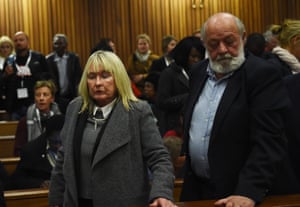Oscar Pistorius sentenced to six years imprisonment for murder
 Oscar Pistorius has been sentenced to six years’ imprisonment for the murder of Reeva Steenkamp in 2013. Judge Thokozile Masipa said there were “substantial and compelling circumstances” that meant he should not serve the 15-year minimum sentence for murder.
Oscar Pistorius has been sentenced to six years’ imprisonment for the murder of Reeva Steenkamp in 2013. Judge Thokozile Masipa said there were “substantial and compelling circumstances” that meant he should not serve the 15-year minimum sentence for murder.
Masipa said the continuing misperception that Pistorius had intentionally killed Steenkamp was something the court had a duty to correct “to prevent unjustified outrage from the public”
In an hour-long judgment, she said: The life of the accused will never be the same … He is a fallen hero, who has lost his career, and been ruined financially. He cannot be at peace.
But she rejected the defence argument that Pistorius ought to be hospitalised or serve a non-custodial punishment, saying the sentence ought to be unpleasant, uncomfortable and painful.
Masipa said the mitigating factors – that he was vulnerable on his stumps, believed there was an intruder, tried to save Steenkamp’s life and was, in the judge’s view, genuinely remorseful – “outweighed” the aggravating factors, which she listed as using a lethal weapon, with high-grade ammunition, firing four times with no warning shot, and “knowing full well” there was someone inside the toilet cubicle.
The murder of Steenkamp was not, she said, a case of gender violence. There is no indication at all that the deceased was in an abusive relationship.

However, campaigners for women’s rights in South Africa expressed disappointment with the sentence. Jacqui Mofokeng of the African National Congress women’s league, who has attended much of the trial and was in court today, said:
“The judgment is an insult to women. It sends the wrong message”.
The instructing attorney for the defence, Andrew Fawcett, has told reporters that the Pistorius team does not intend to appeal the sentence and that they respect Masipa’s decision.
Pistorius will serve the sentence handed down by the court, he says, adding that he will have to serve “between half and two-thirds of the sentence” before he can apply for parole.
But he adds that the defence team will of course “react” if the state decides to appeal the sentence.











